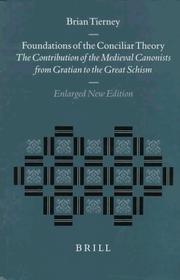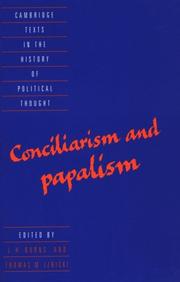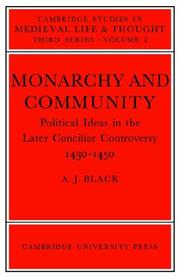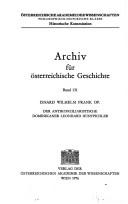| Listing 1 - 10 of 35 | << page >> |
Sort by
|

ISBN: 9004109242 9004477500 9789004109247 9789004477506 Year: 1998 Volume: 81 Publisher: Köln ; New York ; Leiden Brill
Abstract | Keywords | Export | Availability | Bookmark
 Loading...
Loading...Choose an application
- Reference Manager
- EndNote
- RefWorks (Direct export to RefWorks)
A major problem which occupied thinkers in the later Middle Ages was the question of the internal structure of the Church and the proper interrelationship of its members. This book is an account of those canonistic theories of Church government which contributed to the growth of the conciliar theory, and which were formulated between Gratian's Decretum (c. 1140) and the Great Schism (1378). It is concerned particularly with the juristic development of the fundamental conciliar doctrine, the assertion that the universal Church was superior to the Church of Rome, with a consequent denial of the Pope's supreme authority. Foundations of the Conciliar Theory is considered by many to be one of those rare books that significantly influenced twentieth century medieval studies. Now again available in a new enlarged edition, it will continue to be an indispensable work for all those interested in Church history and the Middle Ages.
Conciliaire theorie --- Conciliar theory --- Conciliarism --- Conciliarisme --- Théorie conciliaire --- History of doctrines --- 260.322.3 --- -Conciliarism --- Concilies: leergezag. Conciliarisme --- -Conciliar theory --- -Concilies: leergezag. Conciliarisme --- -260.322.3 --- 260.322.3 Concilies: leergezag. Conciliarisme --- -260.322.3 Concilies: leergezag. Conciliarisme --- Religious thought --- Middle Ages, 600-1500 --- Middle Ages, 500-1500 --- Conciliar theory - History of doctrines - Middle Ages, 600-1500

ISBN: 0521470897 0521476747 0511804210 Year: 1997 Publisher: Cambridge : Cambridge University Press,
Abstract | Keywords | Export | Availability | Bookmark
 Loading...
Loading...Choose an application
- Reference Manager
- EndNote
- RefWorks (Direct export to RefWorks)
Almost on the eve of the sixteenth-century Reformation, the long-running debate over the respective authority of popes and councils in the Catholic Church was vigorously resumed. In this collection the editors bring together the first English translation of four major contributions to that debate. In these texts, complex arguments derived from Scripture, theology, and canon law are deployed. The issues that emerge, however, prove to have a broader significance. What is foreshadowed here is the confrontation between 'absolutism' and 'constitutionalism' which was to be a dominant theme in the politics of early-modern Europe and beyond. Even on the threshold of the twenty-first century the concerns that underlie and animate the scholastic disputations in these pages retain their force. This 1997 volume includes introductory material which elucidates the context of the debate, as well as a comprehensive bibliography.
Conciliar theory --- Théorie conciliaire --- Early works to 1800. --- Ouvrages avant 1800 --- 321.01 --- Conciliarism --- Algemene staatsleer. Politieke filosofie. Staatsleer. Staatstheorie --- 321.01 Algemene staatsleer. Politieke filosofie. Staatsleer. Staatstheorie --- Théorie conciliaire --- Social Sciences --- Political Science --- Conciliar theory. --- Popes --- Primacy.
Book
ISBN: 3525358733 9783525358733 Year: 2006 Volume: 219 29 Publisher: Göttingen Vandenhoeck und Ruprecht
Abstract | Keywords | Export | Availability | Bookmark
 Loading...
Loading...Choose an application
- Reference Manager
- EndNote
- RefWorks (Direct export to RefWorks)
Councils and synods --- Conciliar theory --- History --- History of doctrines --- Christian councils and synods --- Church councils --- Synods --- Religious gatherings --- Conciliarism --- Councils and synods - History - Middle Ages, 600-1500 - Congresses. --- Conciliar theory - History of doctrines - Middle Ages, 600-1500 - Congresses.
Book
ISBN: 9781107015746 9781107448711 9781139059459 9781139233828 1139233823 110701574X 9781139230834 110723025X 1139234536 1280485701 113923305X 9786613580689 1139230832 1139229370 1139059459 1139232282 1107448719 Year: 2012 Publisher: Cambridge Cambridge University Press
Abstract | Keywords | Export | Availability | Bookmark
 Loading...
Loading...Choose an application
- Reference Manager
- EndNote
- RefWorks (Direct export to RefWorks)
Conciliarism is one of the oldest and most essential means of decision-making in the history of the Christian church. Indeed, as a leading Orthodox theologian Alexander Schmemann states, 'Before we understand the place and the function of the council in the church, we must, therefore, see the church herself as a council.' Paul Valliere tells the story of councils and conciliar decision-making in the Christian church from earliest times to the present. Drawing extensively upon the scholarship on conciliarism which has appeared in the last half-century, Valliere brings a broad ecumenical perspective to the study and shows how the conciliar tradition of the Christian past can serve as a resource for resolving conflicts in the church today. The book presents a conciliarism which involves historical legacy, but which leads us forward, not backward, and which keeps the church's collective eyes on the prize - the eschatological kingdom of God.
Théorie conciliaire --- Histoire --- Conciliar theory --- -260.322.3 --- Conciliarism --- History. --- Concilies: leergezag. Conciliarisme --- 260.322.3 Concilies: leergezag. Conciliarisme --- 260.322.3 --- History --- Histoire. --- Theology. --- Christian theology --- Theology --- Theology, Christian --- Christianity --- Religion --- Arts and Humanities

ISBN: 0521077397 0521023041 9780521023047 Year: 1970 Publisher: Cambridge : University Press,
Abstract | Keywords | Export | Availability | Bookmark
 Loading...
Loading...Choose an application
- Reference Manager
- EndNote
- RefWorks (Direct export to RefWorks)
260.322.3 --- Concilies: leergezag. Conciliarisme --- Conciliar theory. --- Political science --- History --- 260.322.3 Concilies: leergezag. Conciliarisme --- Conciliar theory --- Conciliarism --- Théorie conciliaire --- Papes --- Église et État --- History. --- Primauté --- Pouvoir temporel
Book
ISBN: 9783110684308 3110684306 3110684373 Year: 2020 Volume: 2 Publisher: Berlin ; Boston : De Gruyter,
Abstract | Keywords | Export | Availability | Bookmark
 Loading...
Loading...Choose an application
- Reference Manager
- EndNote
- RefWorks (Direct export to RefWorks)
Die Geschichte des kanonischen Rechts in den verschiedenen christlichen Kulturen (lateinische, griechische, syrische, koptische) konzentrierte sich mit guten Gründen meist auf inhaltliche und organisatorische Fragen. In dem vorliegenden Band wird hingegen ein Vergleich der Verfahrensweisen gezogen, die zu konziliaren Entscheidungen und damit um die Entstehung von Kirchenrecht führen. Diverse Faktoren wurden beachtet: Einfluss des Staates, konfessionelle und politische Konflikte, persönliche Auseinandersetzungen usw. Angestrebt wurde eine das gesamte Euromediterraneum sowie den Vorderen Orient umfassende Sicht. Ausführlich gewürdigt wurde die soeben abgeschlossene monumentale Edition der Akten des VII. Ökumenischen Konzils (Nicaenum II) durch Erich Lamberz. Angesichts der wissenschaftlichen Vielfalt der beteiligten Autoren ist dieser Band für verschiedenste Wissenschaftsdisziplinen (Kirchengeschichte, Rechtsgeschichte, Mediävistik, Byzantinistik, Orientalistik u.a.) von hoher Relevanz. The history of canon law in various Christian cultures (Latin, Greek, Syrian, Coptic) has, with good reason, mostly concentrated on questions of content and organization. In the present volume, however, a comparison is made of the procedures leading to conciliar decisions and thus to the emergence of canon law.
Councils and synods (Canon law) --- Canon law --- Church history --- History --- Catholic Church --- Council. --- Kanonisches Recht. --- Konzil. --- Konziliengeschichte. --- Nicaenum II. --- canon law. --- conciliarism. --- HISTORY / Medieval. --- Second Council of Nicaea. --- canonical law. --- conciliar history.
Book
ISBN: 3110626675 1580443508 Year: 2019 Publisher: Kalamazoo, MI : Medieval Institute Publications,
Abstract | Keywords | Export | Availability | Bookmark
 Loading...
Loading...Choose an application
- Reference Manager
- EndNote
- RefWorks (Direct export to RefWorks)
One of the most challenging problems in the history of Western ideas stems from the emergence of Modernity out of the preceding period of the Latin Middle Ages. This volume develops and extends the insights of the noted scholar Thomas M. Izbicki into the so-called medieval/modern divide. The contributors include a wide array of eminent international scholars from the fields of History, Theology, Philosophy, and Political Science, all of whom explore how medieval ideas framed and shaped the thought of later centuries. This sometimes involved the evolution of intellectual principles associated with the definition and imposition of religious orthodoxy. Also addressed is the Great Schism in the Roman Church that set into question the foundations of ecclesiology. In the same era, philosophical and theoretical innovations reexamined conventional beliefs about metaphysics, epistemology and political life, perhaps best encapsulated by the fifteenth-century philosopher, theologian and political theorist Nicholas of Cusa.
Civilization, Medieval. --- Philosophy, Medieval. --- Political science --- Schism, The Great Western, 1378-1417. --- Social change --- Theology --- Abendländisches Schisma. --- Great Schism. --- Konziliarismus. --- Moderne. --- Modernity. --- Nicholas of Cusa. --- Nikolaus, von Kues, Kardinal. --- conciliarism. --- heresy. --- History --- Nicholas, --- Europe --- Intellectual life.
Book
ISBN: 3506794418 Year: 1996 Volume: 41 Publisher: Paderborn ; München ; Zürich Schöning
Abstract | Keywords | Export | Availability | Bookmark
 Loading...
Loading...Choose an application
- Reference Manager
- EndNote
- RefWorks (Direct export to RefWorks)
260.322.3 --- 262.131.1 --- Conciliar theory --- Popes --- -Holy See --- See, Holy --- Papacy --- Conciliarism --- Concilies: leergezag. Conciliarisme --- Pausschap: voorrang van de stoel van Petrus --- Primacy --- Antonio da Cannara --- -Concilies: leergezag. Conciliarisme --- 262.131.1 Pausschap: voorrang van de stoel van Petrus --- 260.322.3 Concilies: leergezag. Conciliarisme --- -Conciliarism --- Holy See --- Papal primacy --- Primacy of Peter --- Primacy of the Pope --- Supremacy of the Pope --- Petrine office --- Supremacy --- Antonio, --- History of doctrines --- Middle Ages, 600-1500 --- History --- Middle Ages, 500-1500

ISBN: 3700101473 9783700101475 Year: 1976 Volume: 131 Publisher: Wien Österreichische Akademie der Wissenschaften
Abstract | Keywords | Export | Availability | Bookmark
 Loading...
Loading...Choose an application
- Reference Manager
- EndNote
- RefWorks (Direct export to RefWorks)
Church --- Conciliar theory --- History of doctrines --- Huntpichler, Leonhard, --- Universität Wien --- 260.322.3 --- -Conciliar theory --- -Conciliarism --- Ecclesiastical theology --- Ecclesiology --- Theology, Ecclesiastical --- People of God --- Theology --- Concilies: leergezag. Conciliarisme --- -History of doctrines --- Huntpichler, Leonhard --- Universitat Wien --- Universidad de Viena --- University of Vienna --- Vidensʹkyĭ universytet --- Vienna (Austria). --- Vienna. --- Vienna University --- -Concilies: leergezag. Conciliarisme --- 260.322.3 Concilies: leergezag. Conciliarisme --- -260.322.3 Concilies: leergezag. Conciliarisme --- Conciliarism --- Universität Wien. --- Church - History of doctrines - Middle Ages, 600-1500 --- Conciliar theory - History of doctrines --- Huntpichler, Leonhard, - -1478 --- Vienna (Austria). Universität --- Vienna. Universität
Book
ISBN: 3506746758 9783506746757 Year: 2002 Publisher: Paderborn Schöningh
Abstract | Keywords | Export | Availability | Bookmark
 Loading...
Loading...Choose an application
- Reference Manager
- EndNote
- RefWorks (Direct export to RefWorks)
Christian church history --- anno 1400-1499 --- Pavia --- Siena --- Councils and synods --- Conciliar theory --- History --- Council of Pavia-Siena --- 262.5*26 --- Konstanz--(1414-1418) --- History. --- 262.5*26 Konstanz--(1414-1418) --- Conciliarism --- Councils and synods - History --- Conciliar theory - History --- CONCILE DE PAVIE-SIENNE (1423-1424) --- EGLISE CATHOLIQUE --- HISTOIRE --- 14E-15E SIECLES
| Listing 1 - 10 of 35 | << page >> |
Sort by
|

 Search
Search Feedback
Feedback About UniCat
About UniCat  Help
Help News
News